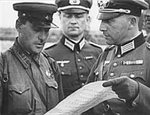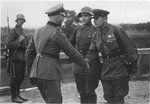On September 17, 1939, at 2:15 a.m. the Polish Ambassador to the U.S.S.R., M. Waclaw Grzybowski, was summoned to the Soviet Foreign Office. On arriving at the Kremlin, he was received by M. Potemkin, who read him a Note to the effect that the Soviets regarded the Polish Government as disintegrated, and the Polish State as having in fact ceased to exist. All agreements concluded between the U.S.S.R. and Poland were in consequence declared to have ceased to operate. Poland bereft of leadership had become a suitable field for all manner of hazards and surprises constituting a threat to the U.S.S.R. Furthermore, the Soviet Government could not view with indifference the fate of the kindred Ukrainian and White Russian people living on Polish territory, and, in existing circumstances, left defenceless.
Accordingly, the Soviet Government had ordered its troops to cross the Polish border and take under their protection the life and property of the population of Western Ukraine and Western White Russia. At the same time, the Soviet Government proposed to extricate the Polish people from the unfortunate war into which they were dragged by their unwise leaders, and enable them to live a peaceful life.
There existed between Poland and the Soviet Republic a pact of non-aggression dated July 25,1932, which on May 5, 1934, was extended until December 31, 1945.
Notwithstanding the strong misgivings aroused in all quarters by the new pact concluded on August 23, 1939, between the Soviets and Germany, in the first days of the war between Poland and Germany a general impression prevailed of a certain good will on the part of the Soviets towards Poland. On August 27 Izvestia published an interview with Marshal Vorosilov who stated that the new understanding with Germany would not prevent Russia from supplying raw materials and even war materials to Poland.
Along the entire Russian border it had been noticed that the tone of Russian broadcasts was not at all unfriendly towards Poland, and on certain frontier stations - much to the amazement of those who were informed - special arrangements were being made in great haste in order to facilitate the transport of goods into Poland. At Molodeczno, it was rumoured, a large convoy of lorries had been rushed over the frontier by night in early September. The Polish Government certainly had difficulties in keeping in touch with its local representatives. Since September 5 it was constantly moving owing to German bombing. But complete tranquillity reigned in the Eastern Provinces of Poland. Mobilisation had taken place under normal conditions and perfectly smoothly; all public authorities were functioning without interruption.
In the light of events it is unnecessary to stress the evident bad faith of the Soviets. The perfidy of Moscow's diplomatic language was vividly reminiscent of many similar documents of the 18th century, when Russia, with Berlin as chief accomplice, undermined the old monarchic Commonwealth of Poland.
In any event, the entrance of the Russian troops was such a surprise, not only to the population but also to the civil and military authorities, that in many places it was thought that the Bolsheviks had entered Poland as allies against Nazi Germany. These doubts were, of course, very soon dispelled. In many places communist "fifth columns" made their appearance with accompanying incidents of violence and plunder. The more determined Polish commanders swerved eastwards, and a new phase of warfare began between the Carpathians and the Dzwina, which lasted another three weeks....
photos: Institute of National Remembrance
Accordingly, the Soviet Government had ordered its troops to cross the Polish border and take under their protection the life and property of the population of Western Ukraine and Western White Russia. At the same time, the Soviet Government proposed to extricate the Polish people from the unfortunate war into which they were dragged by their unwise leaders, and enable them to live a peaceful life.
There existed between Poland and the Soviet Republic a pact of non-aggression dated July 25,1932, which on May 5, 1934, was extended until December 31, 1945.
Notwithstanding the strong misgivings aroused in all quarters by the new pact concluded on August 23, 1939, between the Soviets and Germany, in the first days of the war between Poland and Germany a general impression prevailed of a certain good will on the part of the Soviets towards Poland. On August 27 Izvestia published an interview with Marshal Vorosilov who stated that the new understanding with Germany would not prevent Russia from supplying raw materials and even war materials to Poland.
Along the entire Russian border it had been noticed that the tone of Russian broadcasts was not at all unfriendly towards Poland, and on certain frontier stations - much to the amazement of those who were informed - special arrangements were being made in great haste in order to facilitate the transport of goods into Poland. At Molodeczno, it was rumoured, a large convoy of lorries had been rushed over the frontier by night in early September. The Polish Government certainly had difficulties in keeping in touch with its local representatives. Since September 5 it was constantly moving owing to German bombing. But complete tranquillity reigned in the Eastern Provinces of Poland. Mobilisation had taken place under normal conditions and perfectly smoothly; all public authorities were functioning without interruption.
In the light of events it is unnecessary to stress the evident bad faith of the Soviets. The perfidy of Moscow's diplomatic language was vividly reminiscent of many similar documents of the 18th century, when Russia, with Berlin as chief accomplice, undermined the old monarchic Commonwealth of Poland.
In any event, the entrance of the Russian troops was such a surprise, not only to the population but also to the civil and military authorities, that in many places it was thought that the Bolsheviks had entered Poland as allies against Nazi Germany. These doubts were, of course, very soon dispelled. In many places communist "fifth columns" made their appearance with accompanying incidents of violence and plunder. The more determined Polish commanders swerved eastwards, and a new phase of warfare began between the Carpathians and the Dzwina, which lasted another three weeks....
photos: Institute of National Remembrance



